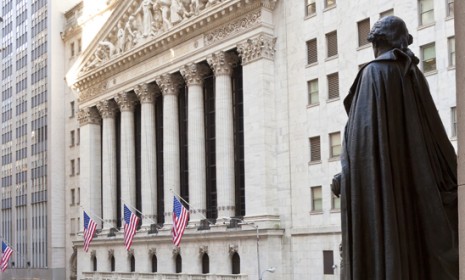Is Wall Street hooked on the Fed's 'monetary morphine'?
Stock markets jump every time the central bank hints that it will continue to support the economy, and some say the Fed is creating a a dangerous dependency

A free daily email with the biggest news stories of the day – and the best features from TheWeek.com
You are now subscribed
Your newsletter sign-up was successful
On Monday, Federal Reserve Chairman Ben Bernanke painted a "notably downbeat" picture of the U.S. economy, saying it was growing too slowly to repair the battered jobs market on its own. But instead of darkening the mood on Wall Street, stocks shot up, and the S&P 500 index reached a four-year high. While it may seem paradoxical, investors weren't celebrating a slumping economy. They were reacting to Bernanke's wink-wink hint that the central bank would continue its "accommodative monetary policies." That means the Fed will keep interest rates ultra-low, which effectively floods the market with money by allowing banks, companies, and Wall Street investors to borrow cash for free and park it in investment vehicles that return interest. But have companies become dangerously addicted to the Fed's "easy money"?
Yes. It's creating an unsustainable bubble: "Wall Street's addiction to free money is on full display," says Mark Gongloff at The Huffington Post. With so much "free cash" floating around, it's "little wonder that stocks are higher" despite the "lousy" economy. The Fed will keep pumping in money even if the "economy tanks," which "seems like a can't-miss proposition." Sound familiar? Oh yeah, it's just like the massive housing bubble that got us into this mess in the first place.
"Ben Bernanke's downbeat predictions lift stocks"
The Week
Escape your echo chamber. Get the facts behind the news, plus analysis from multiple perspectives.

Sign up for The Week's Free Newsletters
From our morning news briefing to a weekly Good News Newsletter, get the best of The Week delivered directly to your inbox.
From our morning news briefing to a weekly Good News Newsletter, get the best of The Week delivered directly to your inbox.
But it won't last forever: Wall Street's addiction to the Fed's "monetary morphine" will hurt it in the long run, says Richard Fisher, the president of the Dallas Federal Reserve and a member of the central bank's policy-making committee. Investors' "preoccupation" with the central bank's monetary policy borders "upon fetish," and they "should begin preparing themselves for the good Dr. Fed to wean them from their dependency rather than administer further dosage." The economy is improving, and it will be a rude awakening for Wall Street if it doesn't start paying better attention to the economy itself.
"Dallas Fed says Wall Street 'hooked on monetary morphine,' don't expect QE3"
Easy money is necessary because the economy still stinks: "Let's leave the addicts aside" and focus on the real reason the Fed is still supporting the economy, says Agustino Fontevecchia at Forbes. The jobs market is weak. Rising gas prices pose a huge potential "headwind" for the recovery. We "shouldn't dismiss the fundamentals," which all indicate that "the economy is still broken." That's why the Fed is intervening.
"Broken job markets and QE3: Bernanke feeds Wall Street's addiction"
A free daily email with the biggest news stories of the day – and the best features from TheWeek.com
-
 One great cookbook: Joshua McFadden’s ‘Six Seasons of Pasta’
One great cookbook: Joshua McFadden’s ‘Six Seasons of Pasta’the week recommends The pasta you know and love. But ever so much better.
-
 Scientists are worried about amoebas
Scientists are worried about amoebasUnder the radar Small and very mighty
-
 Buddhist monks’ US walk for peace
Buddhist monks’ US walk for peaceUnder the Radar Crowds have turned out on the roads from California to Washington and ‘millions are finding hope in their journey’